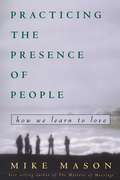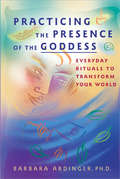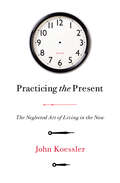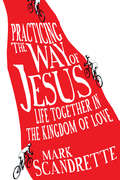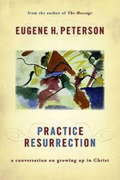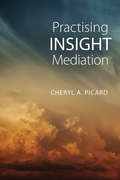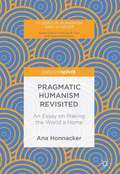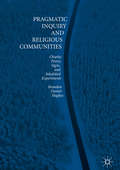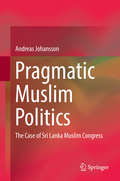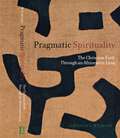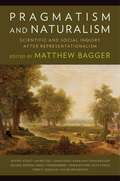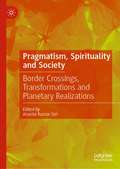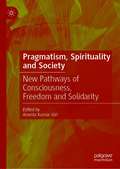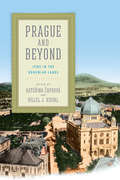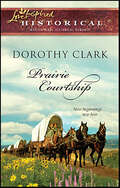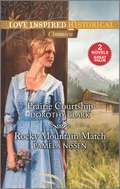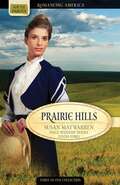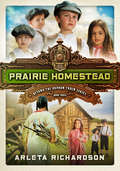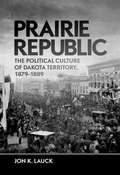- Table View
- List View
Practicing the Presence of People: How We Learn to Love
by Mike MasonIn the deepest part of our hearts and souls is the desire to love well. Yet in our struggle to do so, we learn that, as Mike Mason puts it, "We are not born with love; it is something we must learn." Now, in Practicing the Presence of People, he helps us launch that learning process. Mason points the way to fresh knowledge and fresh experience, showing how we can discover new things about those we love, understand them from the inside out, tenderly identify with their weaknesses, and celebrate that they too were lovingly made by the hand of God.From the Trade Paperback edition.
Practicing the Presence of the Goddess
by Barbara ArdingerMore women than ever are incorporating some kind of spiritual practice into their daily lives, and not always in traditional religious form, but as alternative or hybrid practices. In Practicing the Presence of the Goddess, Barbara Ardinger offers a wide variety of meditations and personal rituals to help women honor the feminine spirit and commune with the Goddess. These include creating a sacred space at home, building a meaningful altar, using ritual and meditation to enrich awareness, and inventing new rituals to celebrate personal events. The author's wry, gentle humor and loving attitude shine through the text, which offers possibilities ranging from bringing love into one's life to having a heart-to-heart with the Goddess.
Practicing the Present: The Neglected Art of Living in the Now
by John KoesslerThe present is more than a place where the past comes to rest.It is more than a staging ground for the future.The present is where God shows up.We live our lives in the present, but often our minds are racing toward the future or overwhelmed by the past. We want to change the past and control the future, but usually all we really do is exhaust ourselves in the here and now. Writing especially with church leaders in mind, Dr. John Koessler, a former pastor and professor, teaches you how to evade the tyranny of past regrets and future plans and meet God right where you are, in the present.
Practicing the Present: The Neglected Art of Living in the Now
by John KoesslerThe present is more than a place where the past comes to rest.It is more than a staging ground for the future.The present is where God shows up.We live our lives in the present, but often our minds are racing toward the future or overwhelmed by the past. We want to change the past and control the future, but usually all we really do is exhaust ourselves in the here and now. Writing especially with church leaders in mind, Dr. John Koessler, a former pastor and professor, teaches you how to evade the tyranny of past regrets and future plans and meet God right where you are, in the present.
Practicing the Way of Jesus: Life Together in the Kingdom of Love
by Mark ScandretteTake a casual survey of how people practice their faith, and you might reasonably conclude that Jesus spent his life going door to door offering private lessons, complete with chalkboard and pop quizzes. We think about God in the comfort of our own minds, in isolation from one another; meanwhile the world waits for a people to practice the way of Jesus together. Mark Scandrette contends that Jesus has in mind something more lively for us: not a classroom so much as a kingdom, where our formation takes place not only in our heads but in our hearts and our bodies, and in the company of one another, in a way that blesses the world we've been entrusted with. In Practicing the Way of Jesus Scandrette draws from his experience as a spiritual director and leader of an intentional community, as well as the best contemporary thinking on kingdom spirituality, to paint a picture of life lived together, in the way of Jesus--which is another way of saying life lived to the full.
Practicing the Way: Be with Jesus. Become like him. Do as he did.
by John Mark ComerWINNER OF ECPA&’S CHRISTIAN BOOK OF THE YEAR AWARD • NEW YORK TIMES BESTSELLER • The author of The Ruthless Elimination of Hurry calls us to rediscover the path that leads to a deeper life with God.&“One of the most important books I have read in a decade . . . If we would all follow in this way, our lives would change and the world would change.&”—Jennie Allen, author of Get Out of Your Head and Find Your PeopleWe are constantly being formed by the world around us. To be formed by Jesus will require us to become his apprentice. To live by what the first Christian disciples called a Rule of Life—a set of practices and relational rhythms that slow us down and open up space in our daily lives for God to do what only God can do—transforms the deepest parts of us to become like him. This introduction to spiritual formation is full of John Mark Comer&’s trademark mix of theological substance and cultural insight as well as practical wisdom on developing your own Rule of Life.These ancient practices have much to offer us. By learning to rearrange our days, we can follow the Way of Jesus. We can be with him. Become like him. And do as he did.
Practise Resurrection: A Conversation On Growing Up In Christ
by Eugene PetersonBook five of Eugene Peterson's landmark SPIRITUAL THEOLOGY series: foundational reading for the twenty-first-century church. Continuing Peterson's evaluation of contemporary Christian spirituality, PRACTISE RESURRECTION is a study of the book of Ephesians. It is often thought to be Paul's most difficult letter, but has been for over thirty years Peterson's text for his identity as a pastor. Peterson points out that although Christians emphasise the importance of new birth, growth is equally important. This book is a conversation on spiritual formation and what it means to become a mature Christian. As with the first four books in this series, PRACTISE RESURRECTION is written for both lay and academic audiences. Challenging but deeply rewarding, it combines scholarship with the human experience and lightness of touch for which Peterson is known.Also available in the Spiritual Theology series: Christ Plays in Ten Thousand Places, Eat This Book, The Jesus Way and The Word Made Flesh.
Practising Insight Mediation
by Cheryl A. PicardA practical companion to the much-acclaimed Transforming Conflict through Insight, Practising Insight Mediation is a book about how insight mediators do their work and why they do it that way. In the book, Cheryl A. Picard, co-founder of insight mediation, explains how the theory of cognition presented in Bernard Lonergan's Insight can be used as the basis for a learning-centred approach to conflict resolution in which the parties involved improve their self-understandings and discover new and less threating patterns of interaction with each other through efforts to better their conflict relations.Practising Insight Mediation features a wide range of valuable resources for any conflict practitioner, including in-depth descriptions of insight communication skills and strategies, a transcribed example mediation, sample documents, and a mediator's self-assessment tool. The essential handbook for those interested in learning about and applying this fast-growing conflict resolution and mediation approach, the book also includes discussions of the latest research into the application of the insight approach to areas including policing, spirituality, and genocide prevention.
Pragmatic Encroachment, Religious Belief, and Practice
by Aaron RizzieriEngaging several recent and important discussions in the mainstream epistemological literature surrounding 'pragmatic encroachment', the volume asks, amongst others, the question: Do the high stakes involved in accepting or rejecting belief in God raise the standards for knowledge that God exists?
Pragmatic Humanism Revisited: An Essay on Making the World a Home (Studies in Humanism and Atheism)
by Ana HonnackerHow can we feel at home in this world without clinging to false certainties? This book offers a humanist re-reading of philosophical pragmatism and explores its potentials for a worldview that relies only on human resources. Thinking along with authors like William James and F.C.S. Schiller, it highlights a fundamentally humanist strand of pragmatism aimed at fostering human creativity and transformative action. It is grounded in everyday experience and underlines our responsibility to strive for the better. Ana Honnacker traces perspectives on science, religion, and ethics in the light of a pragmatic understanding of humanism. Furthermore, she suggests how to address the existential challenges we face today. Thus, pragmatic humanism is explored not only as a philosophy for critical minds, but also as a way of life.
Pragmatic Inquiry and Religious Communities: Charles Peirce, Signs, and Inhabited Experiments
by Brandon Daniel-HughesThis book examines the ways in which religious communities experimentally engage the world and function as fallible inquisitive agents, despite frequent protests to the contrary. Using the philosophy of inquiry and semiotics of Charles Sanders Peirce, it develops unique naturalist conceptions of religious meaning and ultimate orientation while also arguing for a reappraisal of the ways in which the world’s venerable religious traditions enable novel forms of communal inquiry into what Peirce termed “vital matters.” Pragmatic inquiry, it argues, is a ubiquitous and continuous phenomenon. Thus, religious participation, though cautiously conservative in many ways, is best understood as a variety of inhabited experimentation. Religious communities embody historically mediated hypotheses about how best to engage the world and curate networks of semiotic resources for rendering those engagements meaningful. Religions best fulfill their inquisitive function when they both deploy and reform their sign systems as they learn better to engage reality.
Pragmatic Muslim Politics: The Case of Sri Lanka Muslim Congress (Muslims In Global Societies Ser. #9)
by Andreas JohanssonThis book analyses and discusses the use of Islamic terms and symbols in the political party Sri Lanka Muslim Congress (SLMC). It is based on interviews with the leading members of the party and on analyses of the party’s official documents. It describes the history of Muslims in Sri Lanka, presents the analytical framework used, and discusses the official documents and narratives of party members, as well as the details of the Ashraff and Hakeem terms in Parliament. The book provides knowledge about the state of religion and politics in Sri Lanka, and provides insight into how a religious political Muslim party functions as a pragmatic rather than fundamentalist movement. Representing a recent study on the complex relationship between religion and politics, this book greatly advances our understanding of the power of religion and its effect on both individual lives and society.
Pragmatic Spirituality: The Christian Faith through an Africentric Lens
by Gayraud S. WilmoreGayraud S. Wilmore, an internationally renowned scholar of the history of the African American church, is one of the founders of black theology and author of Black Religion and Black Radicalism. Pragmatic Spirituality brings together some of his most compelling writings to speak to continuing issues in African American Christianity and black theology. The volume makes available for the first time several of Wilmore's previously unpublished essays, including a new chapter on womanist theology written for this book. Each chapter has been thoroughly reviewed and where appropriate reworked for this volume in order to create a coherent work which reveals a consistent "pragmatic spirituality" in African and African American religious practice. This book presents a view of the Christian faith and life at variance with the quest for personal sanctity by emphasizing communal empowerment for humanization and justice. Pragmatic Spirituality incorporates some of the most engaging of Wilmore's voluminous writings to reinstate a persistent theme: that black or Africentric faith transposes itself from basically numinous and ecstatic elements in African and African diasporic religions to the immediate and practical work of healing and empowering the poor and marginalized. This book transcends a narrow Africentrism to call for a broad acquaintance with a historic motif in black faith that has to do with compassion, justice, equality, and the liberation of all people. This illuminating volume displays Wilmore's influence on the development of black theology for over fifty years, and introduces his work to a new generation of scholars.
Pragmatic Strategy: Eastern Wisdom, Global Success
by Zhichang Zhu Ikujiro NonakaPragmatism is enjoying a renaissance in management studies and the social sciences. Once written off as amoral, relativist and opposed to the ideals of Truth, Reason and Progress, it is now regaining influence in public policy, international relations and business strategy. But what can pragmatism teach us about strategy? How can pragmatic strategies help businesses to succeed? This innovative book presents a pragmatic framework for shaping and solving strategic problems in a practical, creative, ethical and finely balanced manner. To achieve this, the authors draw from Confucian teaching, American pragmatism and Aristotelian practical wisdom, as well as business cases across industries and nations, particularly from emerging economies. With significant theoretical depth, direct practical implication and profound cultural sensitivity, the book is useful for executive managers, public administrators, strategy researchers and advanced students in the search for pragmatic strategies in an interconnected, fast-moving world.
Pragmatism and Naturalism: Scientific and Social Inquiry After Representationalism
by Scott Davis Jeffrey Stout Philip Kitcher Wayne Proudfoot Matthew C. Bagger Professor Nancy Frankenberry Terry Godlove Jonathon Kahn Michael Raposa Jim WetzelMost contemporary philosophers would call themselves naturalists, yet there is little consensus on what naturalism entails. Long signifying the notion that science should inform philosophy, debates over naturalism often hinge on how broadly or narrowly the terms nature and science are defined. The founding figures of American Pragmatism—C. S. Peirce (1839–1914), William James (1842–1910), and John Dewey (1859–1952)—developed a distinctive variety of naturalism by rejecting reductive materialism and instead emphasizing social practices. Owing to this philosophical lineage, pragmatism has made original and insightful contributions to the study of religion as well as to political theory.In Pragmatism and Naturalism, distinguished scholars examine pragmatism’s distinctive form of nonreductive naturalism and consider its merits for the study of religion, democratic theory, and as a general philosophical orientation. Nancy Frankenberry, Philip Kitcher, Wayne Proudfoot, Jeffrey Stout, and others evaluate the contribution pragmatism can make to a viable naturalism, explore what distinguishes pragmatic naturalism from other naturalisms on offer, and address the pertinence of pragmatic naturalism to methodological issues in the study of religion. In parts dedicated to historical pragmatists, pragmatism in the philosophy and the study of religion, and pragmatism and democracy, they display the enduring power and contemporary relevance of pragmatic naturalism.
Pragmatism and the Philosophy of Religion
by Michael R. SlaterIn this book, Michael Slater provides a new assessment of pragmatist views in the philosophy of religion. Focusing on the tension between naturalist and anti-naturalist versions of pragmatism, he argues that the anti-naturalist religious views of philosophers such as William James and Charles Peirce provide a powerful alternative to the naturalism and secularism of later pragmatists such as John Dewey and Richard Rorty. Slater first examines the writings of the 'classical pragmatists' - James, Peirce, and Dewey - and argues for the relevance of their views for thinking about such topics as the nature of religion and the viability of natural theology. His final three chapters engage with the religious views of later pragmatists such as Rorty and Philip Kitcher, and with current philosophical debates over metaphysical realism, naturalism, and evidentialism. His book will be of particular interest to philosophers of religion, theologians, and specialists in American philosophy.
Pragmatism, Spirituality and Society: Border Crossings, Transformations and Planetary Realizations
by Ananta Kumar GiriThis book explores border crossing among pragmatism, spirituality and society. It opens up American pragmatism to dialogues with pragmatism and spiritual quest from other traditions such as India and China thus making contemporary pragmatism a part of much needed planetary conversations. It cultivates new visions and practices of spiritual pragmatism building upon the seminal works of Charles Sanders Pierce, William James, Sri Aurobindo, John Dewey, Martin Heidegger, Mahatma Gandhi, B.R. Ambedkar, Ludwig Wittgenstein and Luce Irigaray which can help us rethink and transform conventional conceptions and constructions of practice, pragmatism, language, religion, politics, society, culture and democracy and create new relationships of pragmatism, spirituality and society.
Pragmatism, Spirituality and Society: New Pathways of Consciousness, Freedom and Solidarity
by Ananta Kumar GiriThis book explores the dynamics of interaction between pragmatism and spirituality in the constitution and working of consciousness, freedom and solidarity. This book is cross-cultural and transdisciplinary in nature and brings critical and transformative perspectives from different philosophical and spiritual traditions of the world. It discusses the works of seminal thinkers such as William James, Rudolf Steiner, John Dewey, Swami Vivekananda, Martin Heidegger, Claude Levi-Strauss, Jordan Peterson, Slavos Zizek, Paul Valeri and O.V. Vijayan. It also explores dialogues between pragmatism and other philosophical and intellectual traditions such as Semiotics, Saiva Siddhanta, Vedanta, Trika Shaivism and Tantra. It explores themes such as pragmatism and belief, evolution of consciousness and happiness, spiritual pragmatism and economics of solidarity, value levels democracy, the perforamtive as an aspect of spirituality and transformation of political theology from Kingdom of God to Gardens of God.
Prague Counterpoint (The Zion Covenant Series #2)
by Bodie Thoene Brock ThoeneIn this sequel to the Vienna Prelude, Elisa Lendheim is caught in the center of violence that sweeps Europe as Hitler's plan to annihilate the Jews unfolds. <P><P> Book 2, Zion Covenant series.
Prague and Beyond: Jews in the Bohemian Lands (Jewish Culture and Contexts)
by Kateřina Čapková and Hillel J. KievalPrague's magnificent synagogues and Old Jewish Cemetery attract millions of visitors each year, and travelers who venture beyond the capital find physical evidence of once vibrant Jewish communities in towns and villages throughout today's Czech Republic. For those seeking to learn more about the people who once lived and died at those sites, however, there has until now been no comprehensive account in English of the region's Jews.Prague and Beyond presents a new and accessible history of the Jews of the Bohemian Lands written by an international team of scholars. It offers a multifaceted account of the Jewish people in a region that has been, over the centuries, a part of the Holy Roman Empire and the Habsburg Monarchy, was constituted as the democratic Czechoslovakia in the years following the First World War, became the Nazi Protectorate of Bohemia and Moravia and later a postwar Communist state, and is today's Czech Republic. This ever-changing landscape provides the backdrop for a historical reinterpretation that emphasizes the rootedness of Jews in the Bohemian Lands, the intricate variety of their social, economic, and cultural relationships, their negotiations with state power, the connections that existed among Jewish communities, and the close, if often conflictual, ties between Jews and their non-Jewish neighbors.Prague and Beyond is written in a narrative style with a focus on several unifying themes across the periods. These include migration and mobility; the shape of social networks; religious life and education; civic rights, citizenship, and Jewish autonomy; gender and the family; popular culture; and memory and commemorative practices. Collectively these perspectives work to revise conventional understandings of Central Europe's Jewish past and present, and more fully capture the diversity and multivalence of life in the Bohemian Lands.
Prairie Courtship
by Dorothy ClarkNo one could love a female doctor-Emma Allen knows that well. But her spinsterhood bothers her less than the lack of opportunity to use her medical training. In Missouri, no one trusts a female doctor, either. Then the opportunity arises to join a wagon train headed to the Oregon Trail. A new frontier offers a new hope for the life she wants to lead. But first she must deal with the hazards of the journey-including infuriating wagon master Zachary Thatcher. Zach riles Emma's temper until she's convinced no man could be more wrong for her. Yet when the treacherous trail challenges them, it takes his experience and her skill working together to bring them safely home.
Prairie Courtship & Rocky Mountain Match
by Pamela Nissen Dorothy ClarkNew frontiers…and new challengesPrairie Courtship by Dorothy ClarkEmma Allen’s spinsterhood bothers her less than the lack of opportunity to use her medical training. A wagon train headed to the Oregon Trail offers a new hope for the life she wants to lead. But first she must deal with the hazards of the journey—including infuriating wagon master Zachary Thatcher!Rocky Mountain Match by Pamela NissenWhen blindness strikes carpenter Joseph Drake, the prospect of a lifetime of darkness fills him with despair. But strong-willed teacher Katie Ellickson knows what it’s like to be an outcast, and she won’t give up on him. Joseph thinks blindness is his most difficult obstacle, until he finds a bigger challenge—trying to reach Katie’s heart. Will she let him?
Prairie Hills: Letters from the Enemy/Treasure in the Hills/The Dreams of Hannah Williams (Romancing America: South Dakota)
by Linda Ford Susan May Warren Paige Winship DoolyRide the hill dotted prairie with three independent women. Emma Delaney is doing fine on her own until her daughter decides to play matchmaker. Hannah Williams relishes her freedom until a local rancher tries to solve all her problems for her. Lilly Clark is content with her choices until siding with an immigrant against prejudice puts her at odds with the whole town. Will each woman surrender when faith and love call to them?
Prairie Homestead
by Arleta RichardsonSince their mama died and their pa left, Ethan, Alice, Simon, and Will Cooper have not known much of a home. But now that the orphan train has taken them to Mr. and Mrs. Rush in Nebraska, their dreams of home may become a reality. The kids discover that life on a farm is full of challenges. Ethan learns how to drive a plow, watch for snakes, and deal with bullies at the country school. Alice learns to slop the hogs and live with a big sister who isn't exactly welcoming. Will seems to be the only one of the four that their new mother likes. And Simon disappears--again. The third book in the Beyond the Orphan Train series, Prairie Homestead is an adventure in new beginnings and lasting faith.
Prairie Republic: The Political Culture of Dakota Territory, 1879-1889
by Jon K. LauckAMERICAN DEMOCRATIC IDEALS, civic republicanism, and Christianity were the dominant forces at work during South Dakota's formative decade. Territorial politics in the late nineteenth-century West is typically viewed as a game of unprincipled opportunism or as a drunken exercise in bombast and rascality. Now, Jon K. Lauck examines anew the values we like to think were at work during the founding of our western states. Taking Dakota Territory as a laboratory for examining a formative stage of western politics, Lauck finds that settlers from New England and the Midwest brought democratic practices and republican values to the northern plains and invoked them as guiding principles in the drive for South Dakota statehood. Prairie Republic corrects an overemphasis on class conflict and economic determinism, factors posited decades ago by such historians as Howard R. Lamar. Instead, Lauck finds South Dakota's political founders to be agents of Protestant Christianity and of civic republicanism-- an age- old ideology that entrusted the polity to independent, landowning citizens who placed the common interest above private interest. Focusing on the political culture widely shared among settlers attracted to the Great Dakota Boom of the 1880s, Lauck shows how they embraced civic virtue, broad political participation, and agrarian ideals. Family was central in their lives, as were common- school education, work, and Christian community. In rescuing the story of Dakota's settlers from historical obscurity, Prairie Republic dissents from the recent darker portrayals of western history and expands our view and understanding of the American democratic tradition.
